Bertrand Russell: Life, Career, and Contributions
VerifiedAdded on 2023/06/14
|9
|2703
|322
AI Summary
This paper intends to give an overview of the life and the career of one of the greatest figures of the 20th century, Bertrand Russell. He made significant contributions in the field of philosophy, mathematics and literature. It was in view of the contributions made by him in the diverse fields of learning that he was awarded the Nobel Prize in the year 1950. This particular paper will also provide an overview of his ideas related to religion, society and also about the early part of his life. The paper will also take into consideration his association with the mathematical group which enabled him to write his masterpiece.
Contribute Materials
Your contribution can guide someone’s learning journey. Share your
documents today.
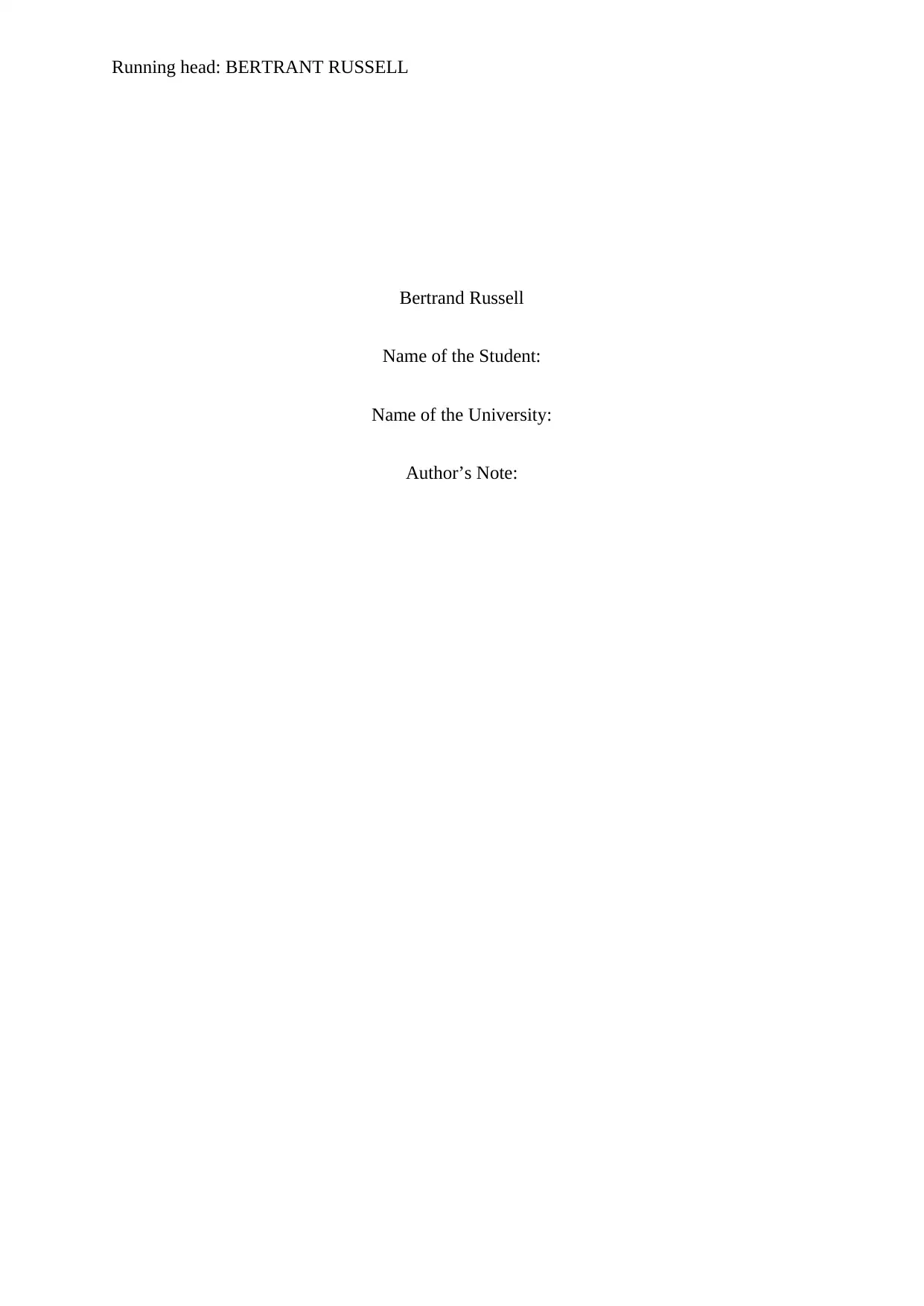
Running head: BERTRANT RUSSELL
Bertrand Russell
Name of the Student:
Name of the University:
Author’s Note:
Bertrand Russell
Name of the Student:
Name of the University:
Author’s Note:
Secure Best Marks with AI Grader
Need help grading? Try our AI Grader for instant feedback on your assignments.
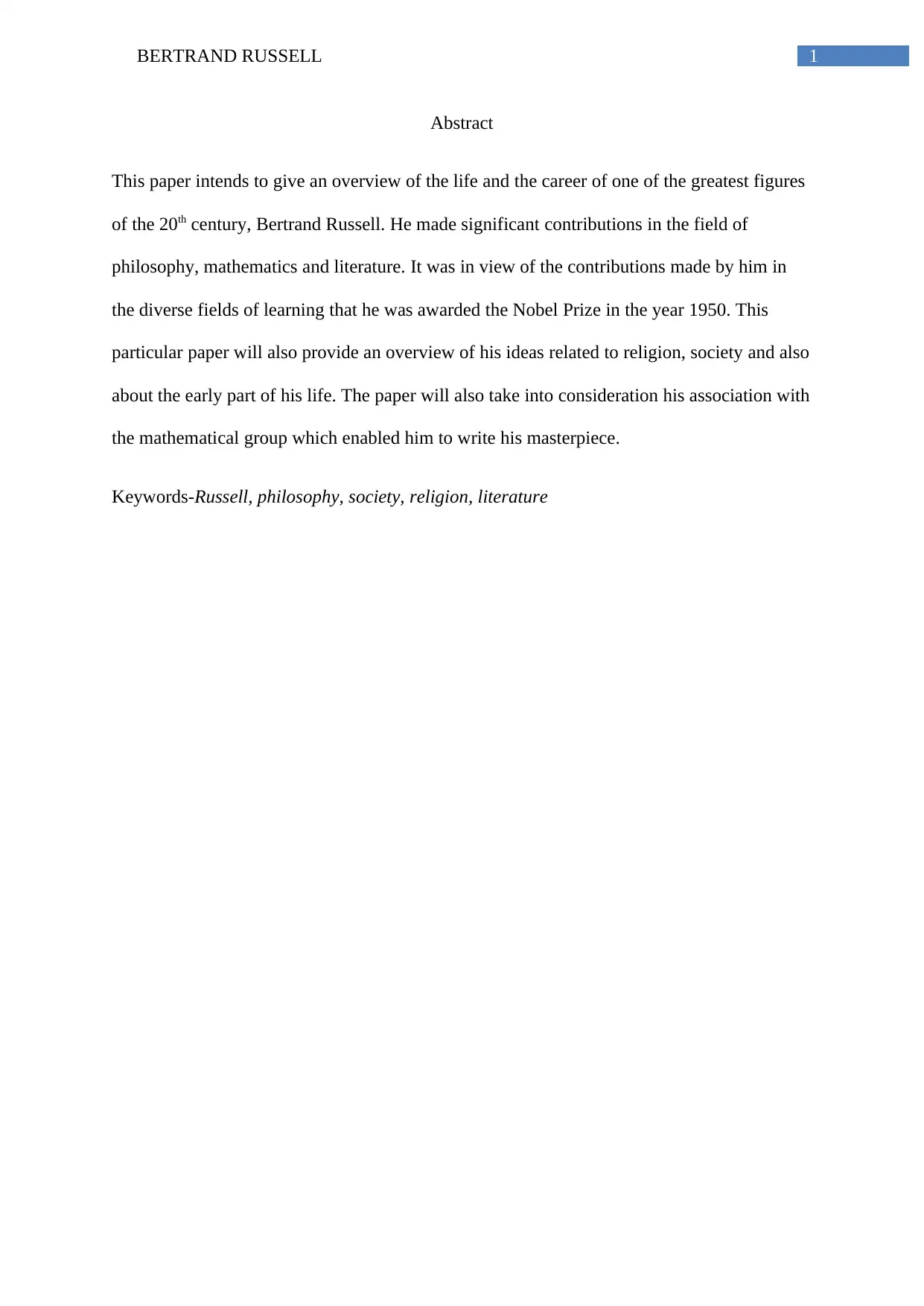
1BERTRAND RUSSELL
Abstract
This paper intends to give an overview of the life and the career of one of the greatest figures
of the 20th century, Bertrand Russell. He made significant contributions in the field of
philosophy, mathematics and literature. It was in view of the contributions made by him in
the diverse fields of learning that he was awarded the Nobel Prize in the year 1950. This
particular paper will also provide an overview of his ideas related to religion, society and also
about the early part of his life. The paper will also take into consideration his association with
the mathematical group which enabled him to write his masterpiece.
Keywords-Russell, philosophy, society, religion, literature
Abstract
This paper intends to give an overview of the life and the career of one of the greatest figures
of the 20th century, Bertrand Russell. He made significant contributions in the field of
philosophy, mathematics and literature. It was in view of the contributions made by him in
the diverse fields of learning that he was awarded the Nobel Prize in the year 1950. This
particular paper will also provide an overview of his ideas related to religion, society and also
about the early part of his life. The paper will also take into consideration his association with
the mathematical group which enabled him to write his masterpiece.
Keywords-Russell, philosophy, society, religion, literature
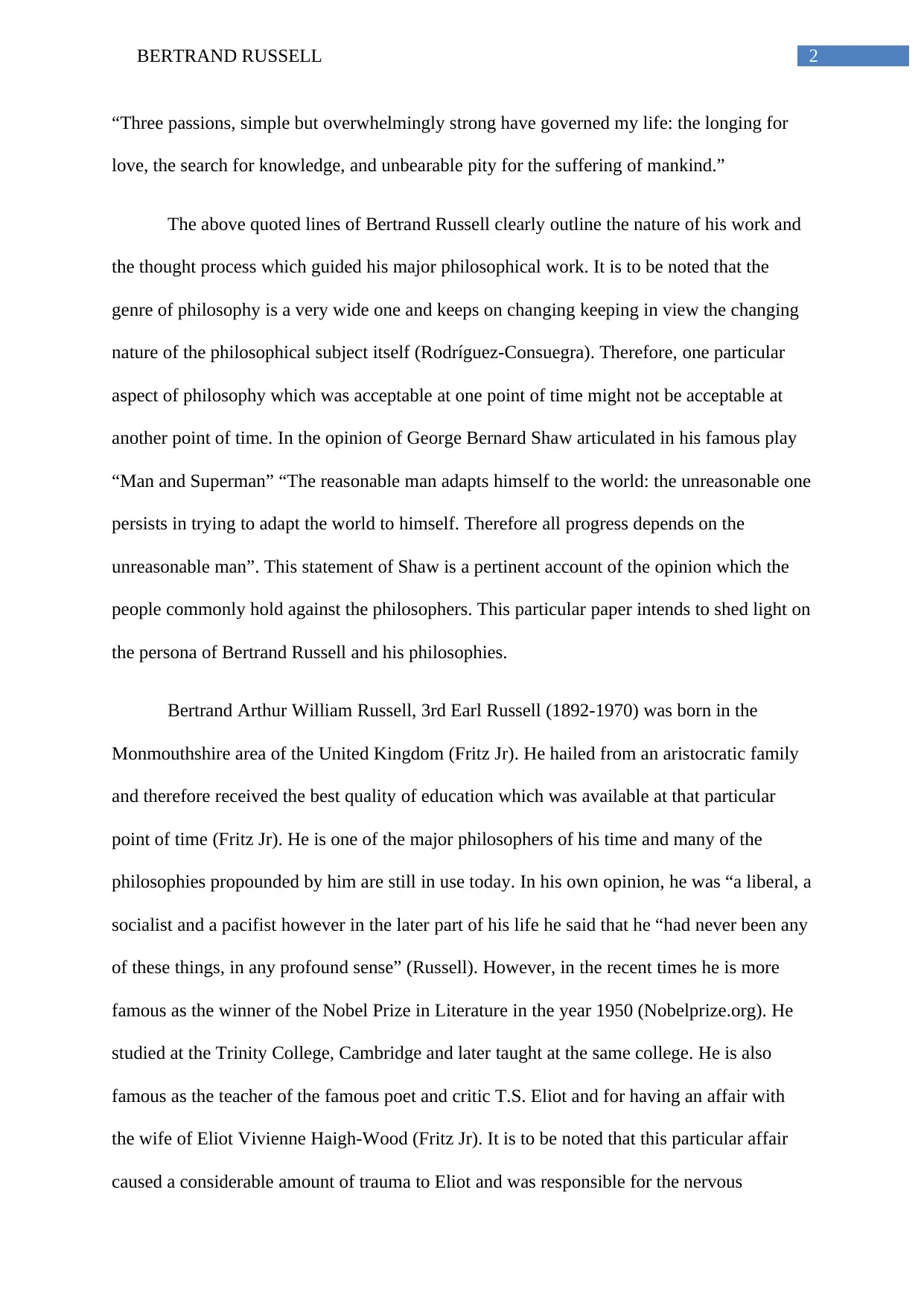
2BERTRAND RUSSELL
“Three passions, simple but overwhelmingly strong have governed my life: the longing for
love, the search for knowledge, and unbearable pity for the suffering of mankind.”
The above quoted lines of Bertrand Russell clearly outline the nature of his work and
the thought process which guided his major philosophical work. It is to be noted that the
genre of philosophy is a very wide one and keeps on changing keeping in view the changing
nature of the philosophical subject itself (Rodríguez-Consuegra). Therefore, one particular
aspect of philosophy which was acceptable at one point of time might not be acceptable at
another point of time. In the opinion of George Bernard Shaw articulated in his famous play
“Man and Superman” “The reasonable man adapts himself to the world: the unreasonable one
persists in trying to adapt the world to himself. Therefore all progress depends on the
unreasonable man”. This statement of Shaw is a pertinent account of the opinion which the
people commonly hold against the philosophers. This particular paper intends to shed light on
the persona of Bertrand Russell and his philosophies.
Bertrand Arthur William Russell, 3rd Earl Russell (1892-1970) was born in the
Monmouthshire area of the United Kingdom (Fritz Jr). He hailed from an aristocratic family
and therefore received the best quality of education which was available at that particular
point of time (Fritz Jr). He is one of the major philosophers of his time and many of the
philosophies propounded by him are still in use today. In his own opinion, he was “a liberal, a
socialist and a pacifist however in the later part of his life he said that he “had never been any
of these things, in any profound sense” (Russell). However, in the recent times he is more
famous as the winner of the Nobel Prize in Literature in the year 1950 (Nobelprize.org). He
studied at the Trinity College, Cambridge and later taught at the same college. He is also
famous as the teacher of the famous poet and critic T.S. Eliot and for having an affair with
the wife of Eliot Vivienne Haigh-Wood (Fritz Jr). It is to be noted that this particular affair
caused a considerable amount of trauma to Eliot and was responsible for the nervous
“Three passions, simple but overwhelmingly strong have governed my life: the longing for
love, the search for knowledge, and unbearable pity for the suffering of mankind.”
The above quoted lines of Bertrand Russell clearly outline the nature of his work and
the thought process which guided his major philosophical work. It is to be noted that the
genre of philosophy is a very wide one and keeps on changing keeping in view the changing
nature of the philosophical subject itself (Rodríguez-Consuegra). Therefore, one particular
aspect of philosophy which was acceptable at one point of time might not be acceptable at
another point of time. In the opinion of George Bernard Shaw articulated in his famous play
“Man and Superman” “The reasonable man adapts himself to the world: the unreasonable one
persists in trying to adapt the world to himself. Therefore all progress depends on the
unreasonable man”. This statement of Shaw is a pertinent account of the opinion which the
people commonly hold against the philosophers. This particular paper intends to shed light on
the persona of Bertrand Russell and his philosophies.
Bertrand Arthur William Russell, 3rd Earl Russell (1892-1970) was born in the
Monmouthshire area of the United Kingdom (Fritz Jr). He hailed from an aristocratic family
and therefore received the best quality of education which was available at that particular
point of time (Fritz Jr). He is one of the major philosophers of his time and many of the
philosophies propounded by him are still in use today. In his own opinion, he was “a liberal, a
socialist and a pacifist however in the later part of his life he said that he “had never been any
of these things, in any profound sense” (Russell). However, in the recent times he is more
famous as the winner of the Nobel Prize in Literature in the year 1950 (Nobelprize.org). He
studied at the Trinity College, Cambridge and later taught at the same college. He is also
famous as the teacher of the famous poet and critic T.S. Eliot and for having an affair with
the wife of Eliot Vivienne Haigh-Wood (Fritz Jr). It is to be noted that this particular affair
caused a considerable amount of trauma to Eliot and was responsible for the nervous
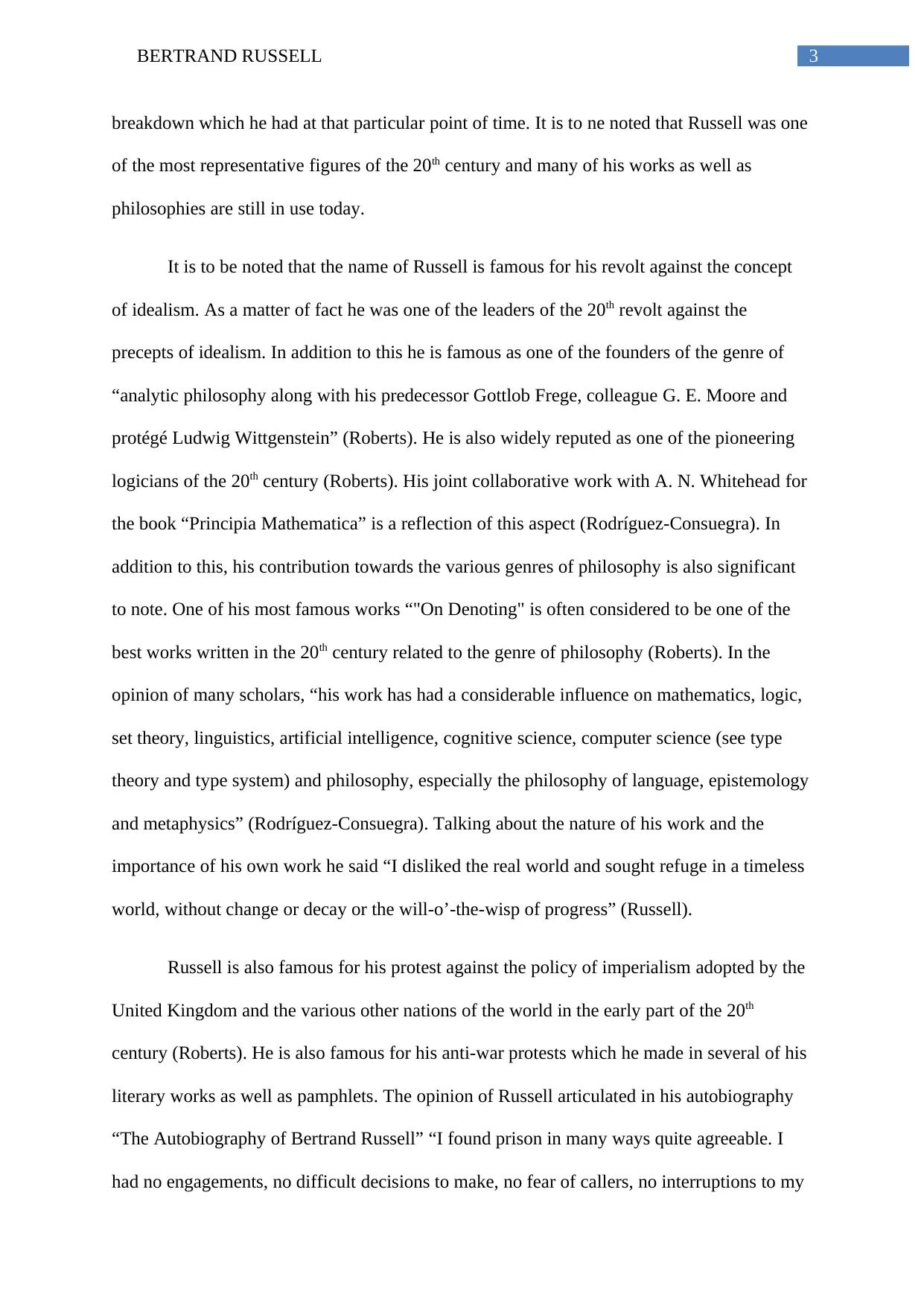
3BERTRAND RUSSELL
breakdown which he had at that particular point of time. It is to ne noted that Russell was one
of the most representative figures of the 20th century and many of his works as well as
philosophies are still in use today.
It is to be noted that the name of Russell is famous for his revolt against the concept
of idealism. As a matter of fact he was one of the leaders of the 20th revolt against the
precepts of idealism. In addition to this he is famous as one of the founders of the genre of
“analytic philosophy along with his predecessor Gottlob Frege, colleague G. E. Moore and
protégé Ludwig Wittgenstein” (Roberts). He is also widely reputed as one of the pioneering
logicians of the 20th century (Roberts). His joint collaborative work with A. N. Whitehead for
the book “Principia Mathematica” is a reflection of this aspect (Rodríguez-Consuegra). In
addition to this, his contribution towards the various genres of philosophy is also significant
to note. One of his most famous works “"On Denoting" is often considered to be one of the
best works written in the 20th century related to the genre of philosophy (Roberts). In the
opinion of many scholars, “his work has had a considerable influence on mathematics, logic,
set theory, linguistics, artificial intelligence, cognitive science, computer science (see type
theory and type system) and philosophy, especially the philosophy of language, epistemology
and metaphysics” (Rodríguez-Consuegra). Talking about the nature of his work and the
importance of his own work he said “I disliked the real world and sought refuge in a timeless
world, without change or decay or the will-o’-the-wisp of progress” (Russell).
Russell is also famous for his protest against the policy of imperialism adopted by the
United Kingdom and the various other nations of the world in the early part of the 20th
century (Roberts). He is also famous for his anti-war protests which he made in several of his
literary works as well as pamphlets. The opinion of Russell articulated in his autobiography
“The Autobiography of Bertrand Russell” “I found prison in many ways quite agreeable. I
had no engagements, no difficult decisions to make, no fear of callers, no interruptions to my
breakdown which he had at that particular point of time. It is to ne noted that Russell was one
of the most representative figures of the 20th century and many of his works as well as
philosophies are still in use today.
It is to be noted that the name of Russell is famous for his revolt against the concept
of idealism. As a matter of fact he was one of the leaders of the 20th revolt against the
precepts of idealism. In addition to this he is famous as one of the founders of the genre of
“analytic philosophy along with his predecessor Gottlob Frege, colleague G. E. Moore and
protégé Ludwig Wittgenstein” (Roberts). He is also widely reputed as one of the pioneering
logicians of the 20th century (Roberts). His joint collaborative work with A. N. Whitehead for
the book “Principia Mathematica” is a reflection of this aspect (Rodríguez-Consuegra). In
addition to this, his contribution towards the various genres of philosophy is also significant
to note. One of his most famous works “"On Denoting" is often considered to be one of the
best works written in the 20th century related to the genre of philosophy (Roberts). In the
opinion of many scholars, “his work has had a considerable influence on mathematics, logic,
set theory, linguistics, artificial intelligence, cognitive science, computer science (see type
theory and type system) and philosophy, especially the philosophy of language, epistemology
and metaphysics” (Rodríguez-Consuegra). Talking about the nature of his work and the
importance of his own work he said “I disliked the real world and sought refuge in a timeless
world, without change or decay or the will-o’-the-wisp of progress” (Russell).
Russell is also famous for his protest against the policy of imperialism adopted by the
United Kingdom and the various other nations of the world in the early part of the 20th
century (Roberts). He is also famous for his anti-war protests which he made in several of his
literary works as well as pamphlets. The opinion of Russell articulated in his autobiography
“The Autobiography of Bertrand Russell” “I found prison in many ways quite agreeable. I
had no engagements, no difficult decisions to make, no fear of callers, no interruptions to my
Secure Best Marks with AI Grader
Need help grading? Try our AI Grader for instant feedback on your assignments.
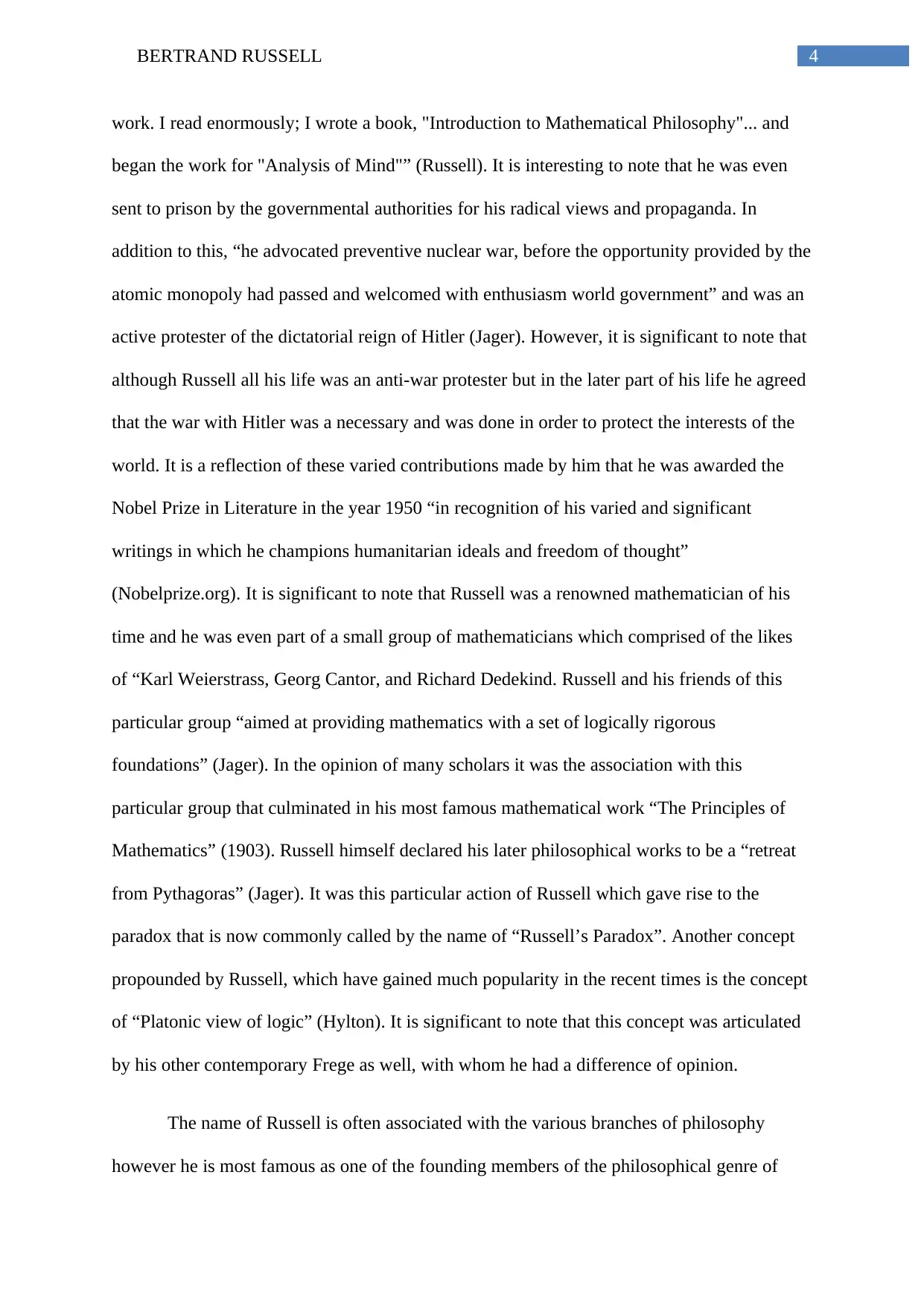
4BERTRAND RUSSELL
work. I read enormously; I wrote a book, "Introduction to Mathematical Philosophy"... and
began the work for "Analysis of Mind"” (Russell). It is interesting to note that he was even
sent to prison by the governmental authorities for his radical views and propaganda. In
addition to this, “he advocated preventive nuclear war, before the opportunity provided by the
atomic monopoly had passed and welcomed with enthusiasm world government” and was an
active protester of the dictatorial reign of Hitler (Jager). However, it is significant to note that
although Russell all his life was an anti-war protester but in the later part of his life he agreed
that the war with Hitler was a necessary and was done in order to protect the interests of the
world. It is a reflection of these varied contributions made by him that he was awarded the
Nobel Prize in Literature in the year 1950 “in recognition of his varied and significant
writings in which he champions humanitarian ideals and freedom of thought”
(Nobelprize.org). It is significant to note that Russell was a renowned mathematician of his
time and he was even part of a small group of mathematicians which comprised of the likes
of “Karl Weierstrass, Georg Cantor, and Richard Dedekind. Russell and his friends of this
particular group “aimed at providing mathematics with a set of logically rigorous
foundations” (Jager). In the opinion of many scholars it was the association with this
particular group that culminated in his most famous mathematical work “The Principles of
Mathematics” (1903). Russell himself declared his later philosophical works to be a “retreat
from Pythagoras” (Jager). It was this particular action of Russell which gave rise to the
paradox that is now commonly called by the name of “Russell’s Paradox”. Another concept
propounded by Russell, which have gained much popularity in the recent times is the concept
of “Platonic view of logic” (Hylton). It is significant to note that this concept was articulated
by his other contemporary Frege as well, with whom he had a difference of opinion.
The name of Russell is often associated with the various branches of philosophy
however he is most famous as one of the founding members of the philosophical genre of
work. I read enormously; I wrote a book, "Introduction to Mathematical Philosophy"... and
began the work for "Analysis of Mind"” (Russell). It is interesting to note that he was even
sent to prison by the governmental authorities for his radical views and propaganda. In
addition to this, “he advocated preventive nuclear war, before the opportunity provided by the
atomic monopoly had passed and welcomed with enthusiasm world government” and was an
active protester of the dictatorial reign of Hitler (Jager). However, it is significant to note that
although Russell all his life was an anti-war protester but in the later part of his life he agreed
that the war with Hitler was a necessary and was done in order to protect the interests of the
world. It is a reflection of these varied contributions made by him that he was awarded the
Nobel Prize in Literature in the year 1950 “in recognition of his varied and significant
writings in which he champions humanitarian ideals and freedom of thought”
(Nobelprize.org). It is significant to note that Russell was a renowned mathematician of his
time and he was even part of a small group of mathematicians which comprised of the likes
of “Karl Weierstrass, Georg Cantor, and Richard Dedekind. Russell and his friends of this
particular group “aimed at providing mathematics with a set of logically rigorous
foundations” (Jager). In the opinion of many scholars it was the association with this
particular group that culminated in his most famous mathematical work “The Principles of
Mathematics” (1903). Russell himself declared his later philosophical works to be a “retreat
from Pythagoras” (Jager). It was this particular action of Russell which gave rise to the
paradox that is now commonly called by the name of “Russell’s Paradox”. Another concept
propounded by Russell, which have gained much popularity in the recent times is the concept
of “Platonic view of logic” (Hylton). It is significant to note that this concept was articulated
by his other contemporary Frege as well, with whom he had a difference of opinion.
The name of Russell is often associated with the various branches of philosophy
however he is most famous as one of the founding members of the philosophical genre of
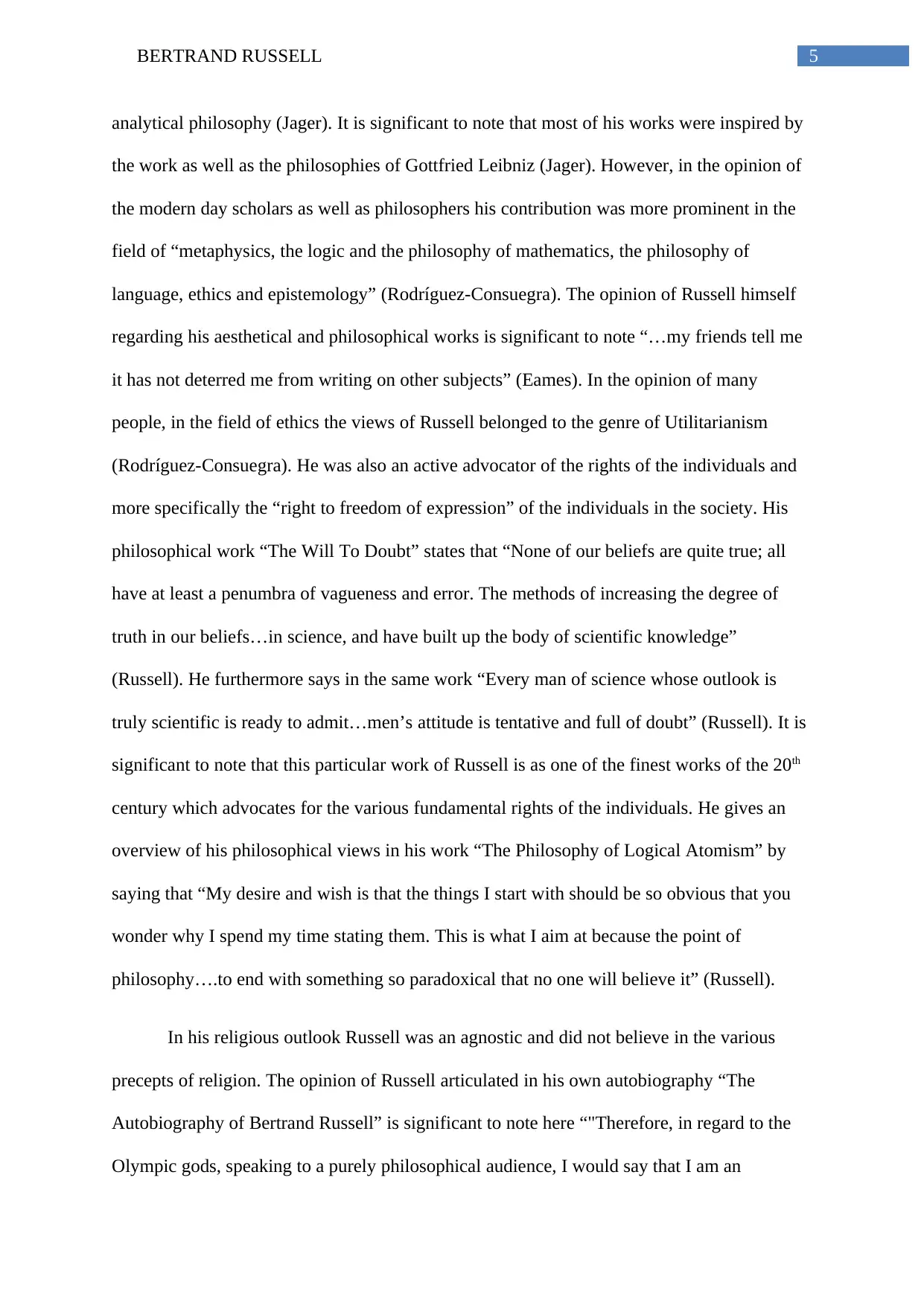
5BERTRAND RUSSELL
analytical philosophy (Jager). It is significant to note that most of his works were inspired by
the work as well as the philosophies of Gottfried Leibniz (Jager). However, in the opinion of
the modern day scholars as well as philosophers his contribution was more prominent in the
field of “metaphysics, the logic and the philosophy of mathematics, the philosophy of
language, ethics and epistemology” (Rodríguez-Consuegra). The opinion of Russell himself
regarding his aesthetical and philosophical works is significant to note “…my friends tell me
it has not deterred me from writing on other subjects” (Eames). In the opinion of many
people, in the field of ethics the views of Russell belonged to the genre of Utilitarianism
(Rodríguez-Consuegra). He was also an active advocator of the rights of the individuals and
more specifically the “right to freedom of expression” of the individuals in the society. His
philosophical work “The Will To Doubt” states that “None of our beliefs are quite true; all
have at least a penumbra of vagueness and error. The methods of increasing the degree of
truth in our beliefs…in science, and have built up the body of scientific knowledge”
(Russell). He furthermore says in the same work “Every man of science whose outlook is
truly scientific is ready to admit…men’s attitude is tentative and full of doubt” (Russell). It is
significant to note that this particular work of Russell is as one of the finest works of the 20th
century which advocates for the various fundamental rights of the individuals. He gives an
overview of his philosophical views in his work “The Philosophy of Logical Atomism” by
saying that “My desire and wish is that the things I start with should be so obvious that you
wonder why I spend my time stating them. This is what I aim at because the point of
philosophy….to end with something so paradoxical that no one will believe it” (Russell).
In his religious outlook Russell was an agnostic and did not believe in the various
precepts of religion. The opinion of Russell articulated in his own autobiography “The
Autobiography of Bertrand Russell” is significant to note here “"Therefore, in regard to the
Olympic gods, speaking to a purely philosophical audience, I would say that I am an
analytical philosophy (Jager). It is significant to note that most of his works were inspired by
the work as well as the philosophies of Gottfried Leibniz (Jager). However, in the opinion of
the modern day scholars as well as philosophers his contribution was more prominent in the
field of “metaphysics, the logic and the philosophy of mathematics, the philosophy of
language, ethics and epistemology” (Rodríguez-Consuegra). The opinion of Russell himself
regarding his aesthetical and philosophical works is significant to note “…my friends tell me
it has not deterred me from writing on other subjects” (Eames). In the opinion of many
people, in the field of ethics the views of Russell belonged to the genre of Utilitarianism
(Rodríguez-Consuegra). He was also an active advocator of the rights of the individuals and
more specifically the “right to freedom of expression” of the individuals in the society. His
philosophical work “The Will To Doubt” states that “None of our beliefs are quite true; all
have at least a penumbra of vagueness and error. The methods of increasing the degree of
truth in our beliefs…in science, and have built up the body of scientific knowledge”
(Russell). He furthermore says in the same work “Every man of science whose outlook is
truly scientific is ready to admit…men’s attitude is tentative and full of doubt” (Russell). It is
significant to note that this particular work of Russell is as one of the finest works of the 20th
century which advocates for the various fundamental rights of the individuals. He gives an
overview of his philosophical views in his work “The Philosophy of Logical Atomism” by
saying that “My desire and wish is that the things I start with should be so obvious that you
wonder why I spend my time stating them. This is what I aim at because the point of
philosophy….to end with something so paradoxical that no one will believe it” (Russell).
In his religious outlook Russell was an agnostic and did not believe in the various
precepts of religion. The opinion of Russell articulated in his own autobiography “The
Autobiography of Bertrand Russell” is significant to note here “"Therefore, in regard to the
Olympic gods, speaking to a purely philosophical audience, I would say that I am an
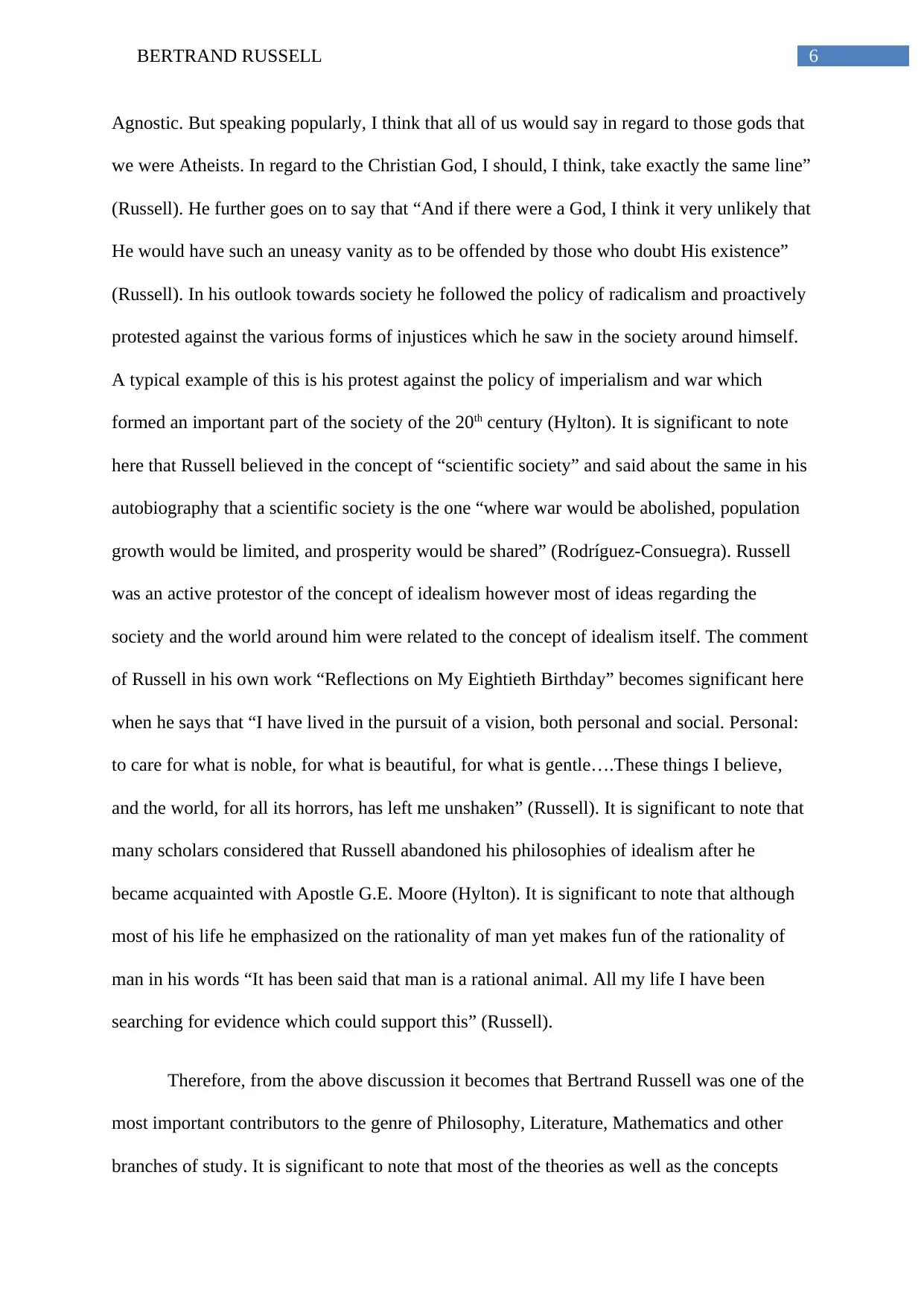
6BERTRAND RUSSELL
Agnostic. But speaking popularly, I think that all of us would say in regard to those gods that
we were Atheists. In regard to the Christian God, I should, I think, take exactly the same line”
(Russell). He further goes on to say that “And if there were a God, I think it very unlikely that
He would have such an uneasy vanity as to be offended by those who doubt His existence”
(Russell). In his outlook towards society he followed the policy of radicalism and proactively
protested against the various forms of injustices which he saw in the society around himself.
A typical example of this is his protest against the policy of imperialism and war which
formed an important part of the society of the 20th century (Hylton). It is significant to note
here that Russell believed in the concept of “scientific society” and said about the same in his
autobiography that a scientific society is the one “where war would be abolished, population
growth would be limited, and prosperity would be shared” (Rodríguez-Consuegra). Russell
was an active protestor of the concept of idealism however most of ideas regarding the
society and the world around him were related to the concept of idealism itself. The comment
of Russell in his own work “Reflections on My Eightieth Birthday” becomes significant here
when he says that “I have lived in the pursuit of a vision, both personal and social. Personal:
to care for what is noble, for what is beautiful, for what is gentle….These things I believe,
and the world, for all its horrors, has left me unshaken” (Russell). It is significant to note that
many scholars considered that Russell abandoned his philosophies of idealism after he
became acquainted with Apostle G.E. Moore (Hylton). It is significant to note that although
most of his life he emphasized on the rationality of man yet makes fun of the rationality of
man in his words “It has been said that man is a rational animal. All my life I have been
searching for evidence which could support this” (Russell).
Therefore, from the above discussion it becomes that Bertrand Russell was one of the
most important contributors to the genre of Philosophy, Literature, Mathematics and other
branches of study. It is significant to note that most of the theories as well as the concepts
Agnostic. But speaking popularly, I think that all of us would say in regard to those gods that
we were Atheists. In regard to the Christian God, I should, I think, take exactly the same line”
(Russell). He further goes on to say that “And if there were a God, I think it very unlikely that
He would have such an uneasy vanity as to be offended by those who doubt His existence”
(Russell). In his outlook towards society he followed the policy of radicalism and proactively
protested against the various forms of injustices which he saw in the society around himself.
A typical example of this is his protest against the policy of imperialism and war which
formed an important part of the society of the 20th century (Hylton). It is significant to note
here that Russell believed in the concept of “scientific society” and said about the same in his
autobiography that a scientific society is the one “where war would be abolished, population
growth would be limited, and prosperity would be shared” (Rodríguez-Consuegra). Russell
was an active protestor of the concept of idealism however most of ideas regarding the
society and the world around him were related to the concept of idealism itself. The comment
of Russell in his own work “Reflections on My Eightieth Birthday” becomes significant here
when he says that “I have lived in the pursuit of a vision, both personal and social. Personal:
to care for what is noble, for what is beautiful, for what is gentle….These things I believe,
and the world, for all its horrors, has left me unshaken” (Russell). It is significant to note that
many scholars considered that Russell abandoned his philosophies of idealism after he
became acquainted with Apostle G.E. Moore (Hylton). It is significant to note that although
most of his life he emphasized on the rationality of man yet makes fun of the rationality of
man in his words “It has been said that man is a rational animal. All my life I have been
searching for evidence which could support this” (Russell).
Therefore, from the above discussion it becomes that Bertrand Russell was one of the
most important contributors to the genre of Philosophy, Literature, Mathematics and other
branches of study. It is significant to note that most of the theories as well as the concepts
Paraphrase This Document
Need a fresh take? Get an instant paraphrase of this document with our AI Paraphraser
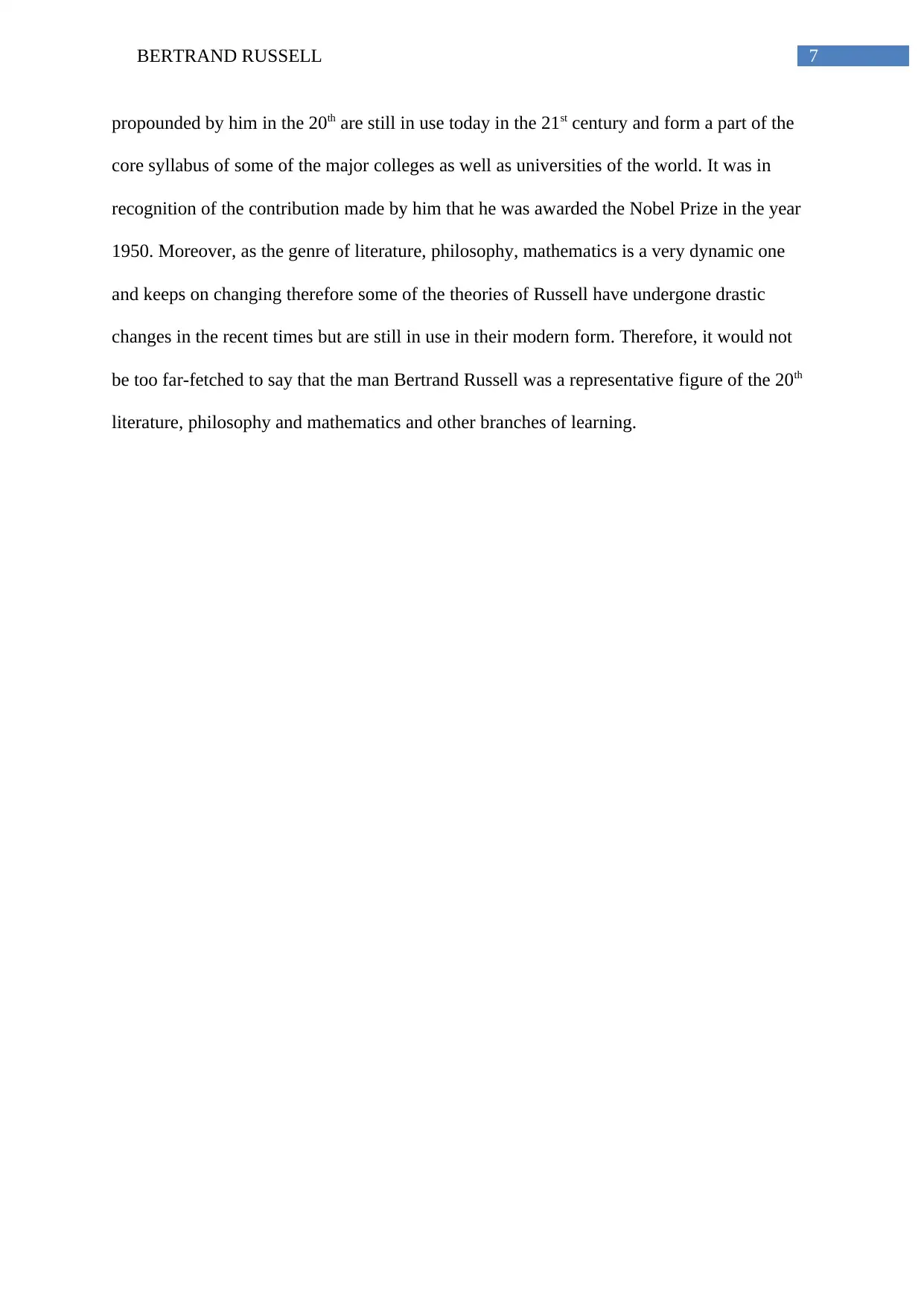
7BERTRAND RUSSELL
propounded by him in the 20th are still in use today in the 21st century and form a part of the
core syllabus of some of the major colleges as well as universities of the world. It was in
recognition of the contribution made by him that he was awarded the Nobel Prize in the year
1950. Moreover, as the genre of literature, philosophy, mathematics is a very dynamic one
and keeps on changing therefore some of the theories of Russell have undergone drastic
changes in the recent times but are still in use in their modern form. Therefore, it would not
be too far-fetched to say that the man Bertrand Russell was a representative figure of the 20th
literature, philosophy and mathematics and other branches of learning.
propounded by him in the 20th are still in use today in the 21st century and form a part of the
core syllabus of some of the major colleges as well as universities of the world. It was in
recognition of the contribution made by him that he was awarded the Nobel Prize in the year
1950. Moreover, as the genre of literature, philosophy, mathematics is a very dynamic one
and keeps on changing therefore some of the theories of Russell have undergone drastic
changes in the recent times but are still in use in their modern form. Therefore, it would not
be too far-fetched to say that the man Bertrand Russell was a representative figure of the 20th
literature, philosophy and mathematics and other branches of learning.
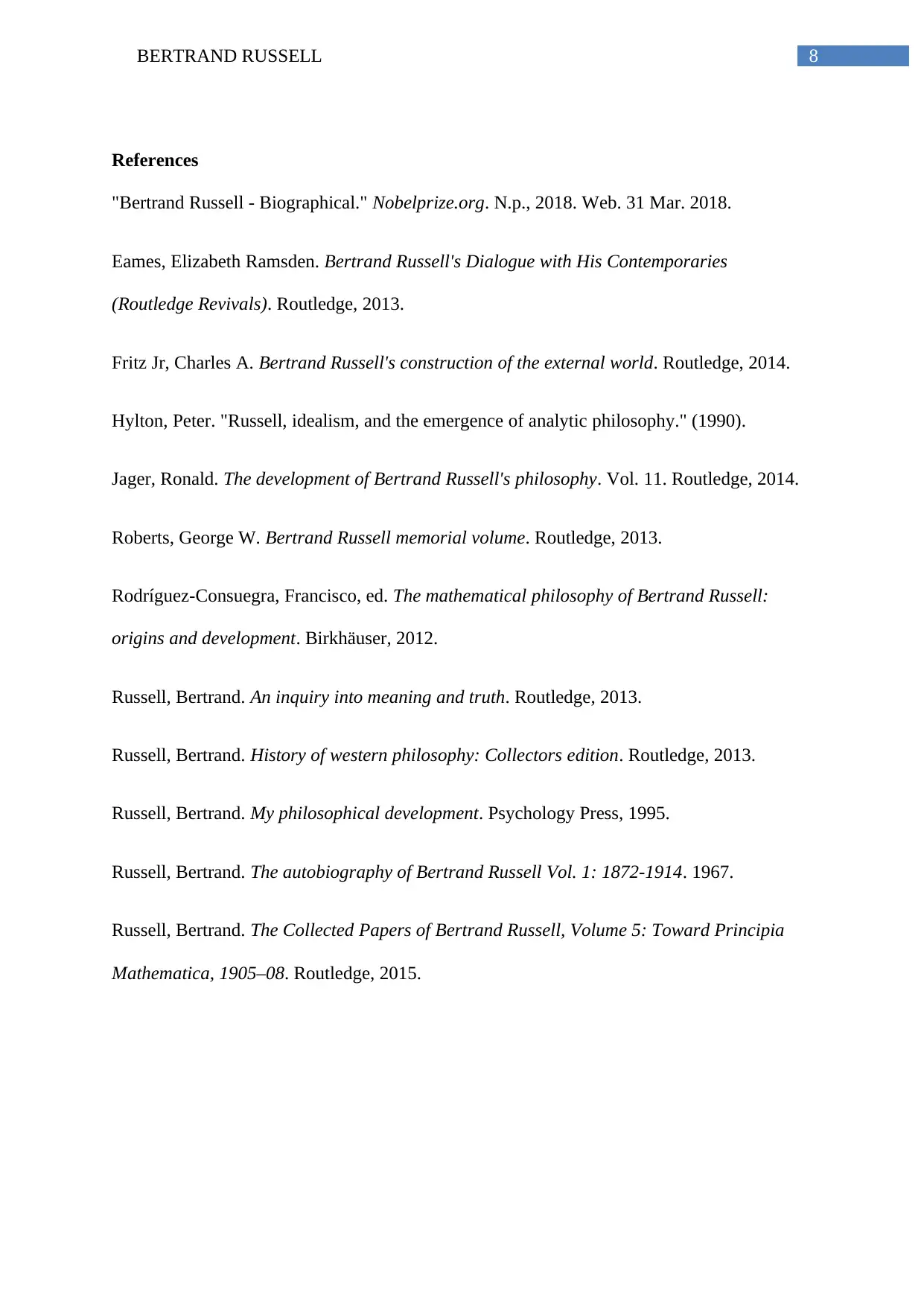
8BERTRAND RUSSELL
References
"Bertrand Russell - Biographical." Nobelprize.org. N.p., 2018. Web. 31 Mar. 2018.
Eames, Elizabeth Ramsden. Bertrand Russell's Dialogue with His Contemporaries
(Routledge Revivals). Routledge, 2013.
Fritz Jr, Charles A. Bertrand Russell's construction of the external world. Routledge, 2014.
Hylton, Peter. "Russell, idealism, and the emergence of analytic philosophy." (1990).
Jager, Ronald. The development of Bertrand Russell's philosophy. Vol. 11. Routledge, 2014.
Roberts, George W. Bertrand Russell memorial volume. Routledge, 2013.
Rodríguez-Consuegra, Francisco, ed. The mathematical philosophy of Bertrand Russell:
origins and development. Birkhäuser, 2012.
Russell, Bertrand. An inquiry into meaning and truth. Routledge, 2013.
Russell, Bertrand. History of western philosophy: Collectors edition. Routledge, 2013.
Russell, Bertrand. My philosophical development. Psychology Press, 1995.
Russell, Bertrand. The autobiography of Bertrand Russell Vol. 1: 1872-1914. 1967.
Russell, Bertrand. The Collected Papers of Bertrand Russell, Volume 5: Toward Principia
Mathematica, 1905–08. Routledge, 2015.
References
"Bertrand Russell - Biographical." Nobelprize.org. N.p., 2018. Web. 31 Mar. 2018.
Eames, Elizabeth Ramsden. Bertrand Russell's Dialogue with His Contemporaries
(Routledge Revivals). Routledge, 2013.
Fritz Jr, Charles A. Bertrand Russell's construction of the external world. Routledge, 2014.
Hylton, Peter. "Russell, idealism, and the emergence of analytic philosophy." (1990).
Jager, Ronald. The development of Bertrand Russell's philosophy. Vol. 11. Routledge, 2014.
Roberts, George W. Bertrand Russell memorial volume. Routledge, 2013.
Rodríguez-Consuegra, Francisco, ed. The mathematical philosophy of Bertrand Russell:
origins and development. Birkhäuser, 2012.
Russell, Bertrand. An inquiry into meaning and truth. Routledge, 2013.
Russell, Bertrand. History of western philosophy: Collectors edition. Routledge, 2013.
Russell, Bertrand. My philosophical development. Psychology Press, 1995.
Russell, Bertrand. The autobiography of Bertrand Russell Vol. 1: 1872-1914. 1967.
Russell, Bertrand. The Collected Papers of Bertrand Russell, Volume 5: Toward Principia
Mathematica, 1905–08. Routledge, 2015.
1 out of 9
Your All-in-One AI-Powered Toolkit for Academic Success.
+13062052269
info@desklib.com
Available 24*7 on WhatsApp / Email
![[object Object]](/_next/static/media/star-bottom.7253800d.svg)
Unlock your academic potential
© 2024 | Zucol Services PVT LTD | All rights reserved.

